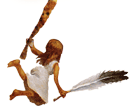








|
|
A Note to Teachers, Librarians and Parents
Read Up On It can be used in a variety of ways for children's education. Below are some ideas teachers, librarians and parents might wish to use or modify.
- Choose a theme and create an anthology of poems.
- Create a word search with the titles of various poems; words can appear horizontally, vertically, diagonally, forwards or backwards.
- Write a collaborative group poem.
- Find riddles or rhymes from around the world.
- Clothesline: children choose poems they like, and then hang them on a clothesline.
- Choose a poem and illustrate it; display the design in the class along with the poem.
- Suggest alternate titles for a poem that you have read.
- Learn a poem from memory, recite it aloud and share it with other classes.
- Cut up poems: find old magazines, cut different text, then stick them on to a clean sheet of paper and make up nonsense poems.
- Happy birthday poets: use a bulletin board to highlight a particular poet, write their biography, and find their picture and the books or poems they have written.
- Bulletin boards: make a "favourite poem" bulletin board.
- Write to the author and explain your reaction to his or her poem or poems.
- Pretend you're a poet and explain why you chose the title of your poem or poems.
- Draw a comic strip of your favourite poem.
- New award: design a new award for children's poetry, select the poem to receive the award, create a medal for the poem and write an explanation of the award and why the poem has earned it.
- Defend a poem: students each choose a poem and explain why they think everyone should read it.
- Keep a journal as you read poems: write your thoughts, feelings and reactions.
- Create a poster or a bookmark for a poem you have read.
- Create a word glossary of unfamiliar words from the poems you have read or are reading.
- Go-around poetry: chairs are placed in a circle, with a poem placed under each chair. The children march around the chairs when the music starts. When the music stops, the children sit down and begin to read the poem under their chair.
- Name the poem: explain to the children how important a title is, and then read a poem without telling them the title. After reading the poem, ask the children to think about what the title should be. Display the poem surrounded by the children's titles.
- Scavenger hunt: divide the class into teams and give each team a copy of the same poem. Have them find objects, events or people in the poem.
- Poem-a-thon: the class could have a daylong poem-a-thon, for which the teacher tabulates the number of poems read. The results could be posted on rungs of a ladder reaching to the sky.
- Write an acrostic poem: each child writes his or her name vertically, then uses each letter to start a line of poetry.
- Poems everywhere: display different things on a table (spoon, popcorn, eraser, etc.). Ask the children to choose one and write a poem. Create a display of the children's poems and objects.
- Poetry race: present several tongue twisters and ask the children to repeat them. Set the record for the most rapid recitation.
- Read poems to the class, and ask the children to clap each time they hear an accented syllable.
- Create a cube with poems written on all sides. Divide the class into groups. Each group will be given a cube, with one person rolling the dice to see which poem their group will be working on. The poem is then recited or acted out.
- Fill-in-the-blank poems: ask the students to complete the fill-in-the-blank poems.
- Study the rules for writing a haiku poem, compose a haiku poem, then illustrate the poem and dedicate it to someone.
- Play spell man (alias hangman) using titles of famous poems.
- Choose a painting, and then make up a poem to go along with the painting.
- Make a poster with pictures of famous poets.
- Draw or paint a picture, then find a poem that relates to it.
- Read a poem and ask the children to recite it out loud or dramatize it.
- Create a poem in a special shape and put it on a bulletin board.
- Create a crossword puzzle featuring world-famous poets.
- Unscramble poetry: give students a list of words and ask them to create a poem using these words.
- Poetry quilt: write a one-sentence poem, then make a poetry quilt.
- Create a class poem asking each student to contribute a line.
- Poetry-mobile: ask the students to write lines on a small piece of paper and make them into a poetry-mobile.
Aspiring Poets
Are you an aspiring young poet who would like to share what you have written? There are Web sites where you can publish your poems. Sharpen your pencils, and let's get started!
Canadian Web Sites
Ado monde - Poésie
www.adomonde.qc.ca/poesie/amitie9.htm
(in French only)
L'Escale - Je rêve d'être poète
www.lescale.net/poesie
(in French only)
KIdsWWwrite
www.kalwriters.com/kidswwwrite/index.html
(in English only)
Wet Ink
An arts magazine for and by Canadian youth
www.wetinkmagazine.com
(in English only)
The best poems by Quebec children
http://poemes.csq.qc.net/index.htm
(in French only)
Young Poets
www.youngpoets.ca
www.youngpoets.ca/ezine/current/french/main_fr.php
(bilingual)
International Web Sites (Canadian content)
AnPlus - Poésie en ligne
http://users.swing.be/anplus
(in French only)
Arbre à poèmes
www.franceweb.fr/poesie/enfants/index.html
(in French only)
Fun House
www.liswa.wa.gov.au/funhouse/
(in English only)
Kids on the Net
http://kotn.ntu.ac.uk
(in English only)
Momes.net - Jeunes poètes
www.momes.net/Journal/jpoetes.html
(in French only)
Poésie française
http://poesie.webnet.fr
(in French only)
The Poetry Zone
www.poetryzone.ndirect.co.uk
(in English only)
|


